“Faith is a beam radiating from the face of God.”
Today, August 19, we celebrate the feast day of Saint Jean Eudes (1601-1680), priest, founder of the congregation of the Sisters of Our Lady of Charity of the Refuge, and devotee of the Sacred Hearts of Jesus and Mary. Saint Jean worked tirelessly throughout his life, building seminaries and increasing the number of religious devoted to the Lord. Pope Benedict XVI has referred to Saint Jean as “an example of priestly holiness.” A prolific writer, his written works (see also here and here)continue to inspire us today.
Jean Eudes was born at Ri (Normandy), France, the son of a farmer. He left home at age fourteen to attend the Jesuit college at Caen, and despite pressure from his parents to marry, pledged himself to the Lord. Jean joined the Congregation of the Oratory of France at the age of 22, continuing his studies in Paris. At age 24 he was ordained a priest, and worked during that time as a volunteer to treat the victims of the plague. For several years, lest he infect his fellow religious, he lived in a huge cask in the middle of a field during the plague.
Saint Jean spent the next decade of his life traveling, conducting missions, and preaching. He drew many to Christ, including many men and women who entered the religious life through his eloquent and persuasive sermons. Saint Jean also developed a reputation as a holy and inspired confessor, who could read the hearts of those who came to him. Well educated by the Jesuits, and strong in his faith, Jean also spoke out against the heretical threat of Jansenism, which caused his difficulties later in his life.
The missions organized by Saint Jean were unlike any other missions during that time. They often lasted several weeks. “Otherwise,” said the saint, “we put a bandage on the wound, but do not heal it.” Processions, hymns, religious plays, special conferences for specific groups, organization of leagues against duels and blasphemy, and visits to the sick occupied the missionaries’ very full days.
Espousing the view that all were called to the Lord, even the most downtrodden and forgotten of society. He was particularly concerned with the plight of prostitutes, but needed a gentle push to assist in their care. One day, one of his parishioners, Madeleine Lamy, who had cared for several of the women, said to him: “Where are you off to now? To some church, I suppose, where you’ll gaze at the images and think yourself pious. And all the time what is really wanted of you is a decent house for these poor creatures.”
Madame Lamy’s words struck Saint Jean deeply, and he promptly founded a refuge for prostitutes in Caen, placing the society under the direction of the Visitandine Order. After resigning from the Oratory of France, he founded his first congregation, the Congregation of Jesus and Mary (referred to as the Eudists), composed of secular priests (who had not taken vows) who were dedicated to establishing seminaries, improving teaching, and preaching missions to increase religious numbers. This foundation was vocally opposed by the Jansenists and the Oratorians (whom he had been a member of only months beforehand), and due to the controversy, he was unable to attain Papal approval and recognition of the Eudists.
Saint Jean was, however, invited to establish a seminary by the Bishop of Coutances, which he graciously did. At the same time, the sisters in his refuge for “fallen women” left the direction of the Visitandines, and were recognized as a new congregation: the Sisters of Our Lady of Charity of the Refuge. This congregation received Papal approval from Pope Alexander III, as an institute to “reclaim and care for penitent wayward women.” However, Jean was unable to obtain approval for the Eudist Order.
Undeterred, Saint Jean continued his work to increase the numbers of religious, founding seminaries throughout France, giving missions, and preaching tirelessly. Along with saint Mary Margaret Alacoque, he initiated the devotion to the Sacred Heart of Jesus and the Holy Heart of Mary. He further wrote several texts to popularize the devotion, including “The Admirable Heart of the Most Holy Mother of God” and “The Devotion to the Adorable Heart of Jesus.” His devotion to the Sacred Heart and to the Immaculate Heart of Mary led Pope Pius XI to declare him the "father, doctor and apostle of the liturgical cult of the Sacred Heart.”
Saint Jean wrote many diverse prayers during his lifetime demonstrating his desire to offer every action of each day to God in a special and meaningful way. One such prayer, in part, reads:
“O Jesus, I offer Thee the rest I am about to take, in honor of the eternal rest Thou dost enjoy in the bosom of Thy Father, and in honor of the sleep and temporal rest Thou didst take in the bosom of Thy Mother, as well as during Thy whole life on earth.”
Saint Jean died in 1680, pronouncing the names of Jesus and Mary. Both the Sisters of Our Lady of Charity and the Congregation of Jesus and Mary continue their good works to this day, throughout the world. During his lifetime, he had preached over 100 missions, and founded over 16 seminaries. The Orders he founded number over 25,000 members today.
Saint Jean believed fully in the unity of the hearts of Jesus and Mary. He wrote: "You must never separate what God has so perfectly united. So closely are Jesus and Mary bound up with each other that whoever beholds Jesus sees Mary; whoever loves Jesus, loves Mary; whoever has devotion to Jesus, has devotion to Mary." We pause to reflect on this thought today, on his feast day. How unified are we—are our hearts—with those of Jesus and Our Blessed Mother?
Father,
you chose the priest John Eudes
to preach the infinite riches of Christ.
By his teaching and example
help us to know You better
and live faithfully in the light of the gospel.
Grant this through our Lord Jesus Christ, Your Son,
who lives and reigns with You and the Holy Spirit,
one God for ever and ever. Amen.
Selected Quotations from Saint Jean Eudes
“Our wish, our object, our chief preoccupation must be to form Jesus in ourselves, to make his spirit, his devotion, his affections, his desires, and his disposition live and reign there. All our religious exercises should be directed to this end. It is the work which God has given us to do unceasingly.”
“Let us therefore give ourselves to God with a great desire to begin to live thus, and beg Him to destroy in us the life of the world of sin, and to establish His life within us.”
“The Christian life is a continuation and completion of the life of Christ in us. We should be so many Christ’s here on earth, continuing His life and His works, laboring and suffering in a holy and divine manner in the spirit of Jesus."
"The air that we breathe, the bread that we eat, the heart which throbs in our bosoms, are not more necessary for man that he may live as a human being, than is prayer for the Christian that he may live as a Christian.”
“A Christian has a union with Jesus Christ more noble, more intimate and more perfect than the members of a human body have with their head.’
“We must continue to accomplish in ourselves the stages of Jesus' life and his mysteries and often to beg him to perfect and realize them in us and in his whole Church. . . . For it is the plan of the Son of God to make us and the whole Church partake in his mysteries and to extend them to and continue them in us and in his whole Church. This is his plan for fulfilling his mysteries in us.”
“The crosses with which our path through life is strewn associate us with Jesus in the mystery of His crucifixion.”
General Audience of Pope Benedict XVI, August 2009
Celebrated today is the liturgical memorial of St. John Eudes, tireless apostle of devotion to the Sacred Hearts of Jesus and Mary, who lived in France in the 17th century, a century marked by opposing religious phenomena and also by great political problems. It was the time of the Thirty Years War, which devastated not only a great part of Central Europe, but also devastated souls.
While contempt was being spread for the Christian faith by some currents of thought that were prevalent then, the Holy Spirit inspired a fervent spiritual renewal, with prominent personalities such as that of Berulle, St. Vincent de Paul, St. Louis Mary Grignion de Montfort and St. John Eudes. This great "French school" of holiness also had St. John Mary Vianney among its fruits. By a mysterious design of Providence, my venerated predecessor, Pius XI, proclaimed John Eudes and the Curé d'Ars saints at the same time, on May 31, 1925, offering the Church and the whole world two extraordinary examples of priestly holiness.
In the context of the Year for Priests, I wish to pause to underline the apostolic zeal of St. John Eudes, directed in particular to the formation of the diocesan clergy.
The saints have verified, in the experience of life, the truth of the Gospel; in this way, they introduce us into the knowledge and understanding of the Gospel. In 1563, the Council of Trent issued norms for the establishment of diocesan seminaries and for the formation of priests, as the council was aware that the whole crisis of the Reformation was also conditioned by the insufficient formation of priests, who were not adequately prepared intellectually and spiritually, in their heart and soul, for the priesthood.
This occurred in 1563 but, given that the application and implementation of the norms took time, both in Germany as well as in France, St. John Eudes saw the consequences of this problem. Moved by the lucid awareness of the great need of spiritual help that souls were feeling precisely because of the incapacity of a great part of the clergy, the saint, who was a parish priest, instituted a congregation dedicated specifically to the formation of priests. He founded the first seminary in the university city of Caen, a highly appreciated endeavor, which was soon extended to other dioceses.
The path of holiness he followed and proposed to his disciples had as its foundation a solid confidence in the love that God revealed to humanity in the priestly Heart of Christ and the maternal Heart of Mary. In that time of cruelty and loss of interior silence, he addressed himself to the heart so as to leave in the heart a word from the Psalms very well interpreted by St. Augustine. He wanted to remind people, men and above all future priests of the heart, showing the priestly Heart of Christ and the maternal Heart of Mary. A priest must be a witness and apostle of this love of the Heart of Christ and of Mary.
Today we also feel the need for priests to witness the infinite mercy of God with a life totally "conquered" by Christ, and for them to learn this in the years of their formation in the seminaries. After the synod of 1990, Pope John Paul II issued the apostolic exhortation "Pastores Dabo Vobis," in which he took up and actualized the norms of the Council of Trent and above all underlined the need for continuity between the initial and permanent moments of formation. For him, for us, this is a real point of departure for a genuine reform of priestly life and apostolate, and it is also the central point so that the "new evangelization" is not simply an attractive slogan, but rather is translated into reality.
The foundations of formation in the seminary constitute that irreplaceable "humus spirituale" in which it is possible to "learn Christ," allowing oneself to be progressively configured to him, sole High Priest and Good Shepherd. The time in the seminary should be seen, therefore, as the actualization of the moment in which the Lord Jesus, after having called the Apostles and before sending them out to preach, asks that they stay with him (cf. Mark 3:14).
When St. Mark narrates the vocation of the Twelve Apostles, he tells us that Jesus had a double objective: The first was that they be with him, the second that they be sent to preach. But in going always with him, they truly proclaim Christ and take the reality of the Gospel to the world.
In this Year for Priests, I invite you to pray, dear brothers and sisters, for priests and for those preparing to receive the extraordinary gift of the priestly ministry. I conclude by addressing to all the exhortation of St. John Eudes, who said thus to priests: "Give yourselves to Jesus to enter into the immensity of his great Heart, which contains the Heart of his Holy Mother and of all the saints, and to lose yourselves in this abyss of love, of charity, of mercy, of humility, of purity, of patience, of submission and of holiness" (Coeur admirable, III, 2).
Why pray the Rosary every day for a year?
Each time the Blessed Virgin has appeared-- whether it be to Saint Bernadette Soubirous at Lourdes; to Lucia, Jacinta, and Francisco at Fatima; or to Mariette Beco at Banneux-- she has asserted the importance, saving grace, and power of praying the Holy Rosary on a daily basis. Based upon her words, the Rosary is penance and conversion for sinners, a pathway to peace, an end to war, and a powerful act of faith in Jesus Christ. Pope Paul VI presented the Rosary as a powerful means to reach Christ "not merely with Mary but indeed, insofar as this is possible to us, in the same way as Mary, who is certainly the one who thought about Him more than anyone else has ever done."
To show us how this is done, perhaps no one has been more eloquent than the great Cardinal Newman, who wrote: "The great power of the Rosary consists in the fact that it translates the Creed into Prayer. Of course, the Creed is already in a certain sense a prayer and a great act of homage towards God, but the Rosary brings us to meditate again on the great truth of His life and death, and brings this truth close to our hearts. Even Christians, although they know God, usually fear rather than love Him. The strength of the Rosary lies in the particular manner in which it considers these mysteries, since all our thinking about Christ is intertwined with the thought of His Mother, in the relations between Mother and Son; the Holy Family is presented to us, the home in which God lived His infinite love."
As Mary said at Fatima, "Jesus wants to use you to make Me known and loved. He wishes to establish the devotion to My Immaculate Heart throughout the world. I promise salvation to whoever embraces it; these souls will be dear to God, like flowers put by Me to adorn his throne."

Subscribe to:
Post Comments (Atom)






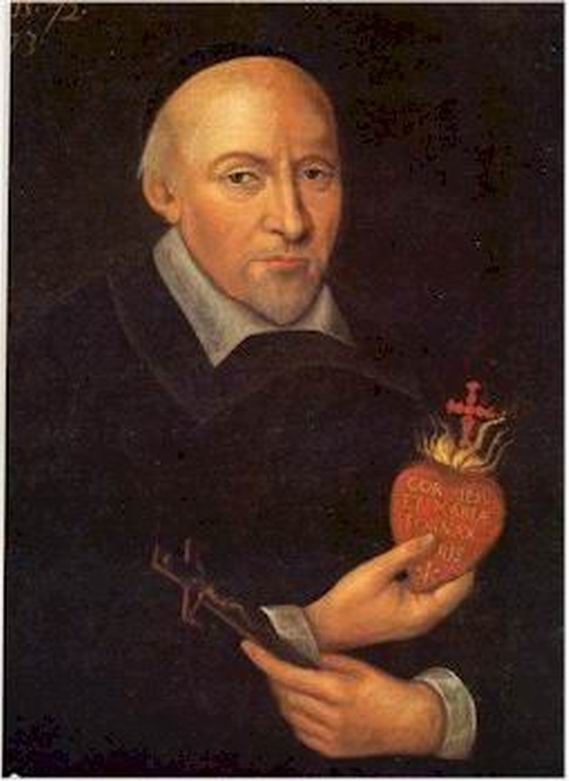
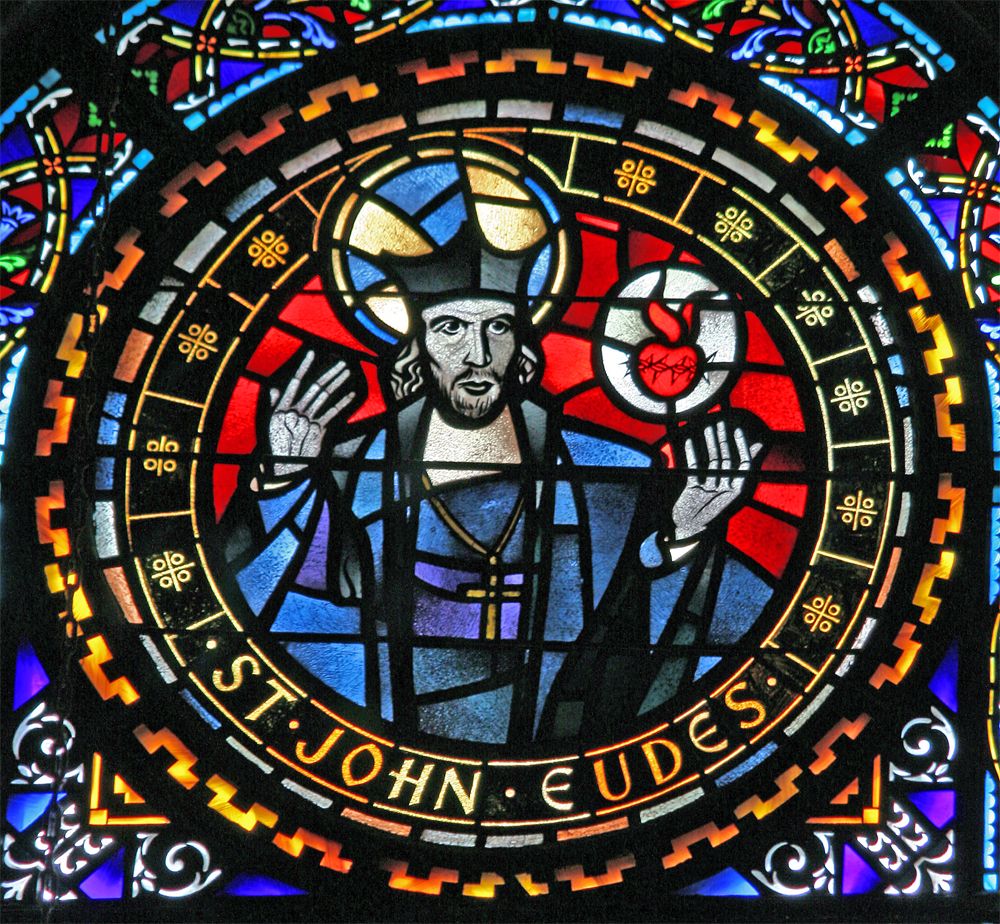
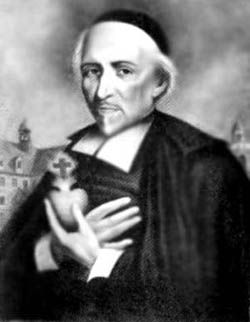

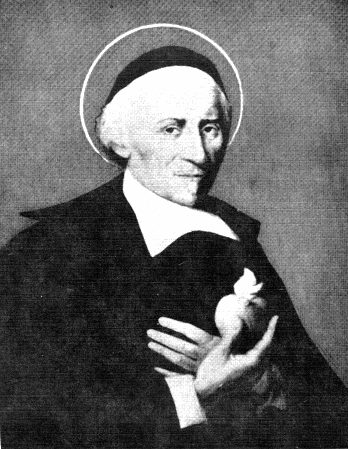
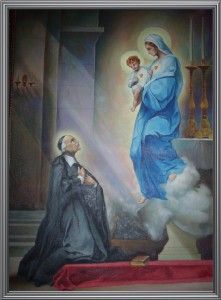
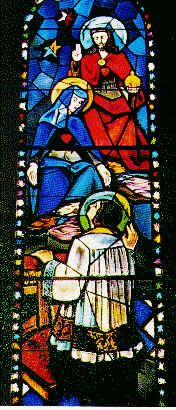

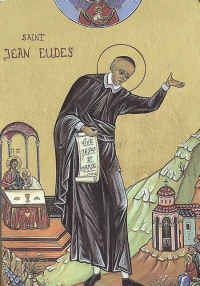
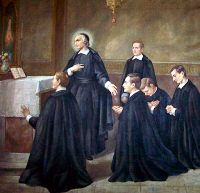
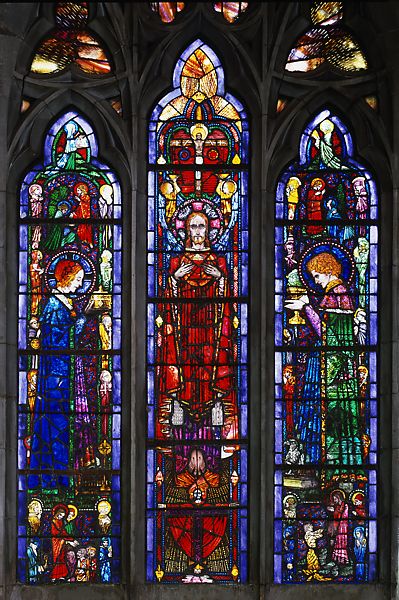

We need the example of St John Eudes in our age in which many, laity and clergy, do not live and practise their faith.
St John Eudes pray for us who live in the 21st century that we may embrace our Lord Jesus Christ to the end of our days. Amen.